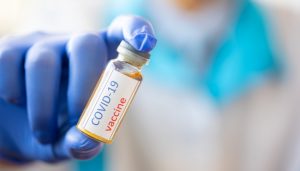
COVID-19 vaccines will begin to arrive in Ukraine under the COVAX mechanism in February this year, head of the EU Delegation to Ukraine Matti Maasikas said.
“We reacted quickly and provided EUR 190 million in aid and 1.2 billion in macro-financial support – an unprecedented amount for a crisis year. Today, the issue of vaccination against the virus has come to the fore. Vaccines under the EU-supported COVAX program will begin to arrive in February,” he said at a meeting of the Commission on coordination of implementation of the Association Agreement between Ukraine and the EU.
“Ukraine and other neighboring countries are a priority for the EU,” Maasikas said.
As reported, within the framework of the COVAX program, Ukraine will receive 117,000 doses of American-made Pfizer-BioNTech m-RNA vaccine in February, and in parallel, during the first half of 2021, from 2.2 to 3.7 million doses of AstraZeneca/Oxford vaccine.
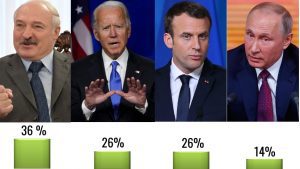
Some 36% of Ukrainians trust Alexander Lukashenko, 26.7% – Joe Biden, 26.2% – Emmanuel Macron and 14.4% – Vladimir Putin, according to the results of a poll conducted by the Kyiv International Institute of Sociology (KIIS) from January 27 to February 1.
According to the research, President of Belarus Alexander Lukashenko, whom the EU and the U.S. do not recognize as legally elected, is trusted by 36% of respondents, distrusted – by 53.6%,there are 7.6% of those who found it difficult to answer, and 2.7% do not know. The balance of trust in Lukashenko is (-17.6%).
U.S. President Joe Biden is trusted by 26.7% of respondents, 23.3% do not trust him, 25.4% found it difficult to answer, and 24.6% do not know. The balance of trust in Biden is (+ 3.4%).
Some 26.2% of respondents trust French President Emmanuel Macron, 23.2% do not trust him, 22.9% found it difficult to answer, and 27.6% do not know. The balance of trust in Macron is (+ 3%).
Some 14.4% of respondents trust Russian President Vladimir Putin, while 79.8% do not trust him, 5.6% found it difficult to answer, and 0.3% do not know. The balance of trust in Putin is (-65.4%).
The all-Ukrainian poll was conducted by personal interviews using tablets (CAPPE). Some 1,205 respondents living in 86 settlements of all regions of Ukraine (except for the Autonomous Republic of Crimea) were interviewed according to a 3-stage stochastic sample with a quota selection at the last stage, which is representative for the population of Ukraine aged 18 and over. In Luhansk and Donetsk regions, the survey was conducted only in the territory controlled by the Ukrainian authorities.
The statistical error of the sample (with a probability of 0.95 and excluding the design effect) does not exceed: 2.9% – for indicators close to 50%, 2.5% – for indicators close to 25%, 1.9% – for indicators close to 12%, and 1.3% – for indicators close to 5%.

The volume of construction work performed in Ukraine in 2020 increased by 4% compared to 2019, while the growth rate in 2019 versus 2018, according to updated data, was 23.6%.
As the State Statistics Service said on Monday, in 2020 the volume of performed construction work amounted to UAH 199 billion.
According to the statistics, in December 2020, the volume of performed construction work increased by 8.2% compared to December 2019, while compared to November 2020, the figure increased by 49.6% (according to seasonally adjusted data, it decreased by 1.2%).
The State Statistics Service said that in 2020 versus 2019, an increase in the volume of construction work was observed only in the segment of construction of engineering structures the figure was 14.8% (in 2019 it was 27.7% versus 2018). At the same time, in residential construction, the decline in construction work was 18.5% (in 2019 an increase of 4.8% compared to 2018), in non-residential construction 2.7% (in 2019 an increase of 30.3% compared to 2018).
The share of new construction in the total volume of completed construction works was 36.1%, renovations 36.9%, reconstruction and technical re-equipment 27%.
In 2020, an increase in the volume of construction work was recorded in 11 regions of Ukraine. The largest increase in the indicator was observed in Khmelnytsky (by 58.3%, to UAH 6.47 billion), Odesa (by 45.8%, to UAH 27.9 billion) and Donetsk (by 35.6%, to UAH 10.1 billion) regions.
A decrease in the volume of completed construction work was recorded in such regions as: Kirovohrad (by 35.9%, to UAH 1.36 billion), Kherson (by 34.9%, to UAH 1.24 billion), and Zaporizhia (by 32.2%, to UAH 2.72 billion), as well as in other regions. In Kyiv city, the indicator decreased by 2.2%, to UAH 42.8 billion.
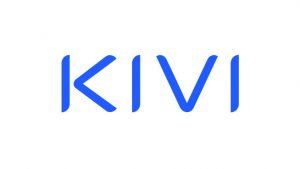
The international TV manufacturer KIVI, headquartered in Ukraine, has signed an agreement on strategic partnership and deep integration with one of the largest electronics manufacturers, Shenzhen MTC (China, Shenzhen).
“In 2021, within the framework of the signed agreement, the Chinese manufacturing giant will invest more than $ 13 million only in the development of a new line of smart TVs KIVI 2021. Investments will be directed to the development of new hardware and software solutions for a significant increase in productivity and the implementation of a number of innovative technologies, new design solutions, as well as improved picture and sound quality,” the Ukrainian company said.
The document also provides for the implementation of a number of innovative projects aimed at developing products under the KIVI brand over the next five years.
KIVI is an international company, developer and manufacturer of smart TVs and TV services. Products under the eponymous brand are sold in the European and Asian markets, and the KIVI TV service is available on all TV sets with the Android system in Ukraine.
The head office of KIVI is located in Kyiv, the development of TV sets and TV services is carried out by an international team of KIVI specialists, and production is carried out at high-tech factories in Europe and Asia.
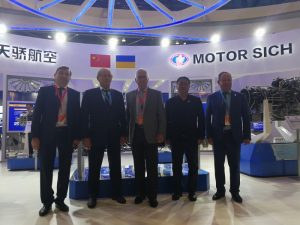
Shareholder of Motor Sich PJSC, Chinese Beijing Skyrizon Aviation Industry Investment Co. considers the sanctions imposed by Ukraine against Skyrizon and related persons for three years to be unreasonable and calls them the main goal of preventing investments in Motor Sich.
Skyrizon, as a shareholder of Motor Sich, will be unlawfully deprived of its legal rights, obligations and commitments, and the company will also be forced to interrupt the generally accepted business relationship with the Ukrainian Motor Sich company, which will entail huge irreversible losses, the company said in a statement on the website, created to attempt to hold a meeting of shareholders of PJSC on January 31, which turned out to be unsuccessful.
Skyrizon also believes that such actions by Ukraine coincide with the goal of the Bureau of Industry and Security (BIS) of the U.S. Department of Commerce, which on January 14 this year put Skyrizon on the Military End-User (MEU) List.
The state of Ukraine rejected the results of the previous negotiations and completely ruled out any possibility of reconciliation between the two sides, the company said.
Skyrizon said that, starting in July 2017, it began negotiations with the state of Ukraine in the hope of “settling misunderstandings and amicably resolving the investment dispute,” but on December 9, 2020, it began international investment arbitration against Ukraine and has already received an official response. “The parties are negotiating and plan to participate in the arbitration process,” the company said.
The Chinese company also said that on January 13, it succeeded in challenging the refusal of an investigator from the State Bureau of Investigation to recognize Skyrizon as an injured party in the Pechersky District Court on January 13 in the case initiated early November last year on its complaint against the SBU.
According to the company, such actions on the part of Ukraine may scare off other potential investors and worsen the situation in the aircraft industry.
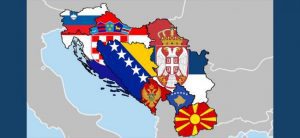
Ukraine is open to negotiations on trade liberalization with Serbia, Albania and Bosnia and Herzegovina, Deputy Minister of Development of Economy, Trade and Agriculture, Trade Representative of Ukraine Taras Kachka has said.
“We have a free trade area with part of the region’s countries through the Ukraine-EU Association Agreement. We have bilateral free trade area agreements with North Macedonia and Montenegro. And we are always open to talks about trade liberalization with Serbia, Bosnia and Herzegovina and Albania,” the trade representative wrote on Facebook.